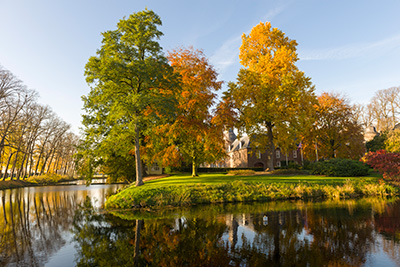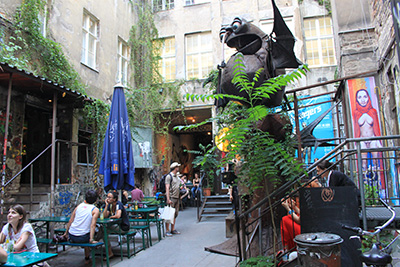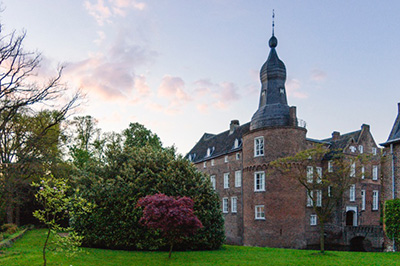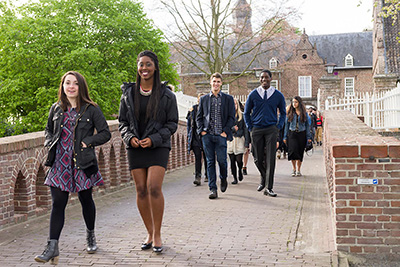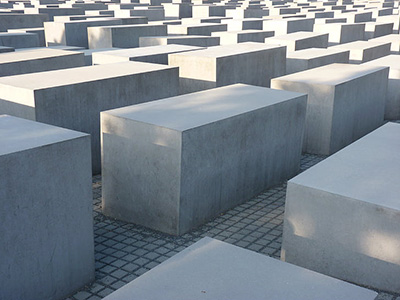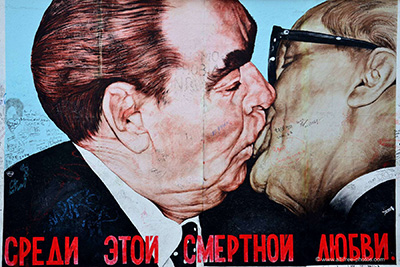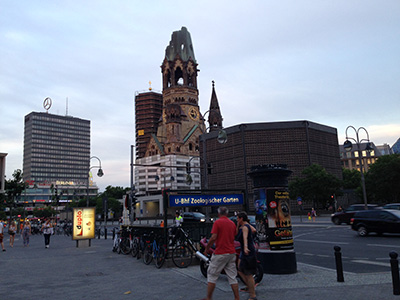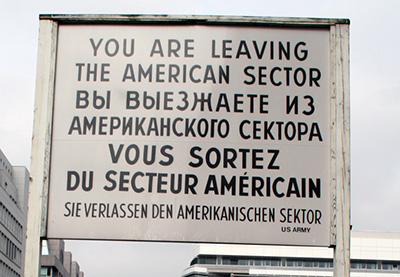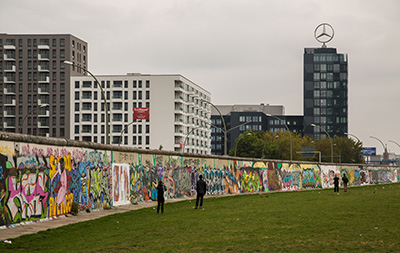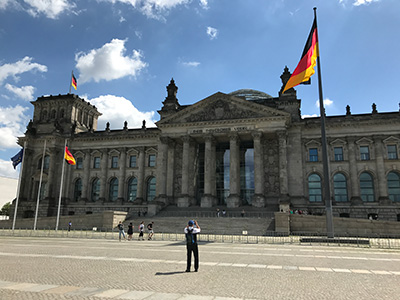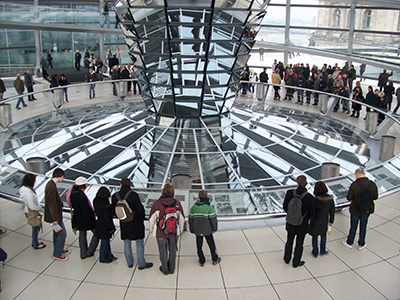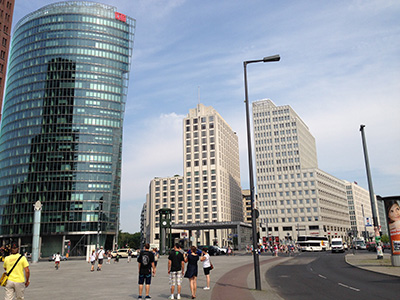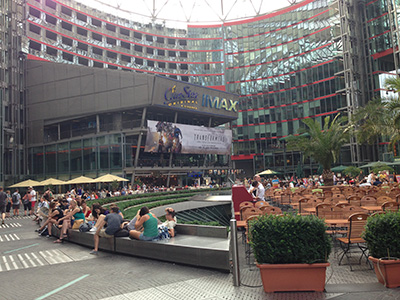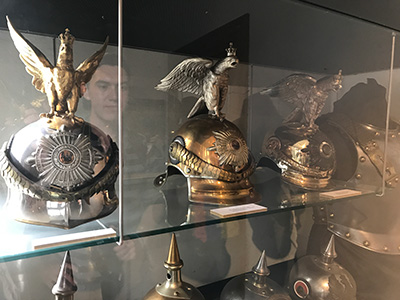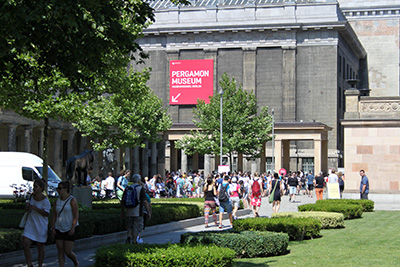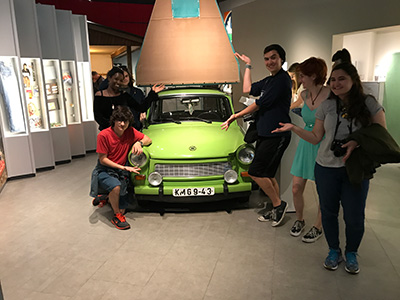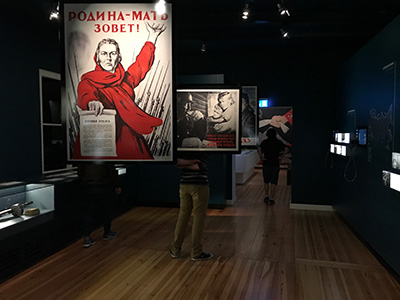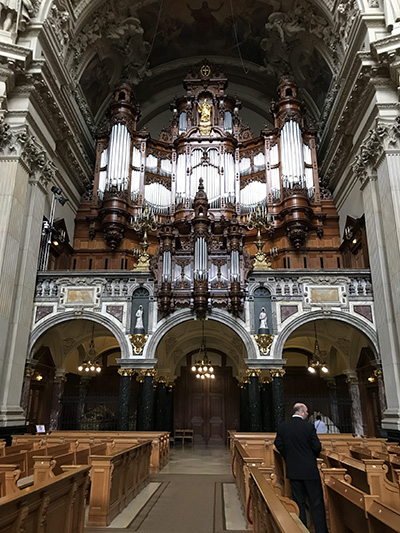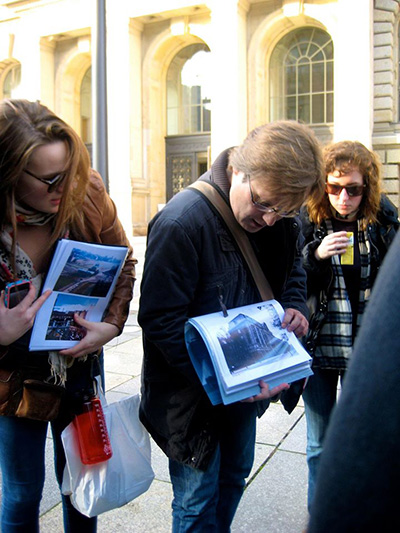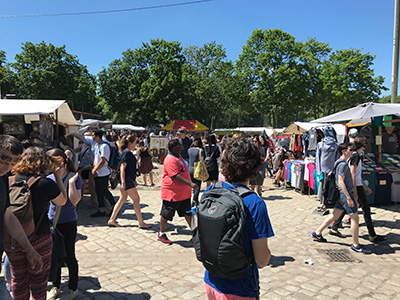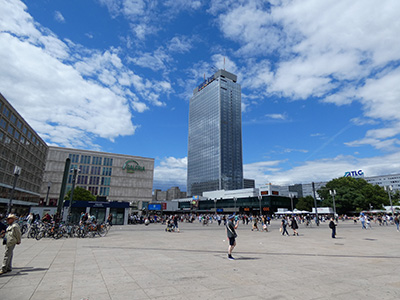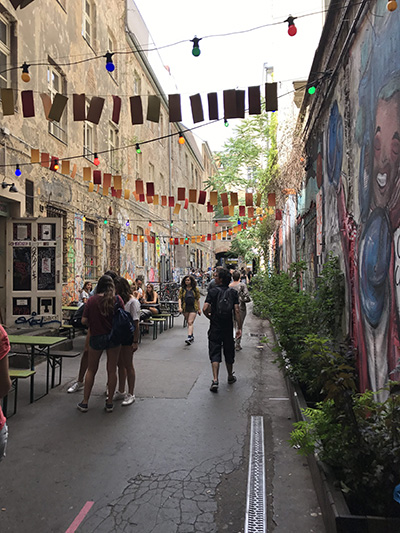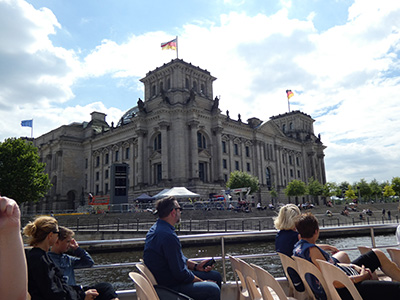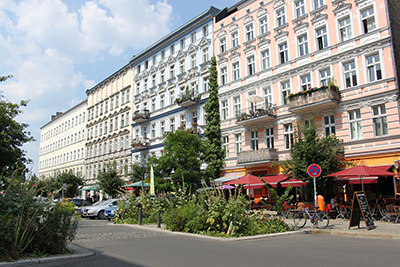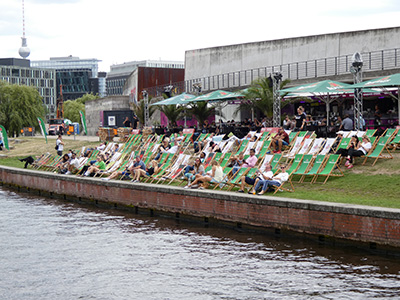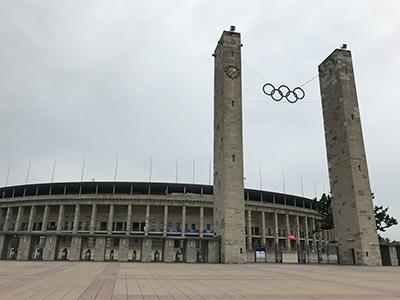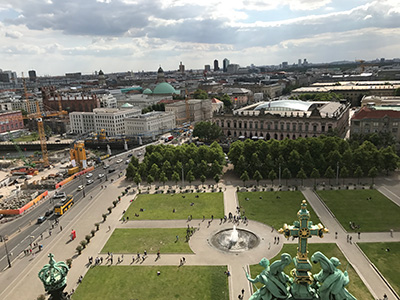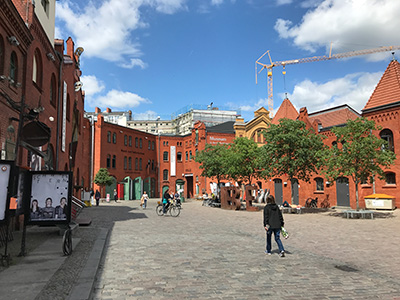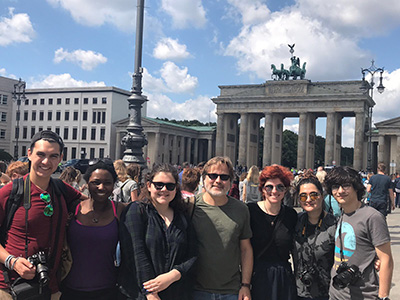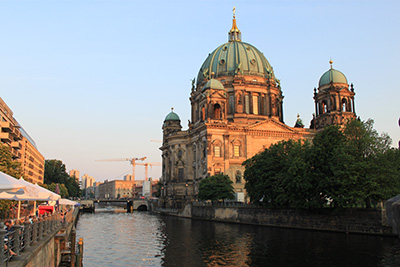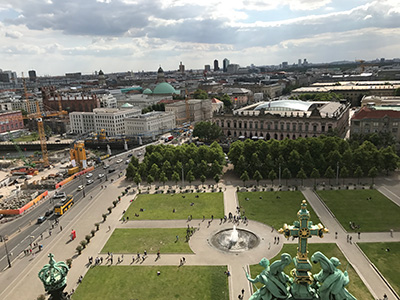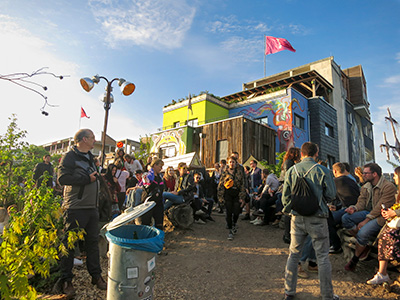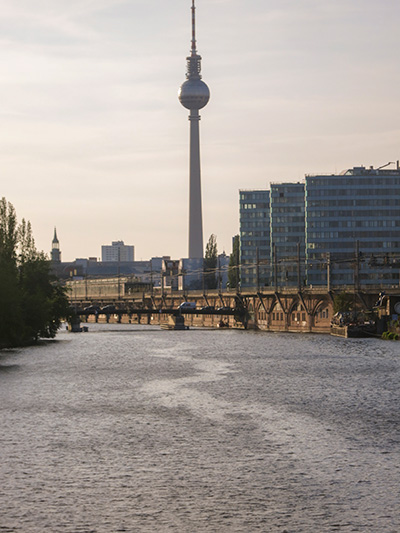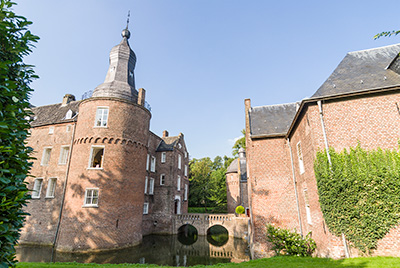Where can I see how history, politics and culture radically changed over the past century? Berlin, of course.
Where can I see today’s most contemporary art exhibitions, film, literature and performance art? Berlin, of course.
Berlin – See it for yourself.
Pre-apply HERE and journey deep into Germany’s historic sites and its contemporary art scene with faculty leaders who are local residents and experts in the fields of modern history and art. Their courses in 20th century History will investigate the complex social, political and artistic history of modern Europe while introducing students to the continent’s most contemporary trends of artistic production and exhibition.
In collaboration with Emerson College, AIA is offering all qualified, undergraduate students a special opportunity to participate in Emerson’s prestigious, 4-week Global Pathways program: Berlin: Metropolis in Motion. This program is open to all undergraduate majors and should be of particular interest to students of: History, Political Science, Art History, Contemporary Art, Film Studies, International Affairs, German Studies and any student in the fields of Humanities and Liberal Arts.
The program kicks-off in the beautiful Kasteel Well castle, just minutes from the German border, and moves to cosmopolitan Berlin, where participants will live in Germany’s vibrant capital to learn about Europe’s modern past and contemporary culture.
At a Glance
- Name: Berlin: Metropolis in Motion
- Where: Berlin, Germany & The Netherlands
- When: May 15 – June 15, 2020
- Cost: $7,900 (see what’s included below)
- Facilities: Kasteel Well castle, The Netherlands (Emerson College) and and Hotel 103, Berlin
- Housing: Dormitory in the castle with full amenities for social activities and comfortable hotel centrally located in Berlin’s lively Prenzlauer Berg district
- Field Trips: Cologne, Kleve, American War Cemetery, Spree River cruise, Potsdam
- Credits: 8 units from Emerson College, Boston
- Courses: Global Cities: Berlin and Contemporary World History
- Faculty Directors: Dr. Ralph Trost & Dr. Leonie Bradbury
- Applications Open: Nov. 1, 2019
- Applications Close: March 1, 2020
- Eligibility: Open to all undergraduate majors from any university through AIA
- Pre-Apply HERE (non-Emerson students)
Berlin: Metropolis in Motion Flyer
See it for Yourself:
Historical Facts & Artistic Interpretation
With its inspired achievements and monumental failures the dramatic events of the 20th century have presented our emerging new millennium with many promises and many challenges. Europe played a key role in shaping the social, philosophical, scientific and aesthetic movements of the global modern condition, and Berlin stood at the epicenter of this century of cultural upheaval. Throughout that time, and still today, writers, artists, film makers and curators have struggled to understand and interpret the events of Modern history. Their work represents both a voice of propaganda and a social critique of authority. It also stands as a testimony of the values and conflicts of individual artist and our shared culture. This past century and a half of rapid change has led to an increasingly interdependent but fragmented modern world culture where ideas are shared at the speed of light, but facts are subjective and reality is in flux.
So, how can we understand our modern society and the past that brought us here? We can see it for ourselves.
This program will help students explore the past directly by visiting the authentic sites of some of Europe’s most important and tumultuous recent history, from the rise and fall of Fascism, the political and economic schism of the continent by the Iron Curtain, the struggles of reunification of Europe, Germany and Berlin itself, and by the challenge of integrating waves of migrants of diverse ethnic and religious backgrounds.
The program’s expert faculty will place these sites and history into a critical, cultural context of period film, literature and visual expression. And they will also introduce students directly to Europe’s dynamic contemporary culture, as they explore today’s most relevant street art, film, performance, visual arts and cultural management, and gallery and museum curation technique.
Live in Berlin & The Netherlands
Berlin
Live and learn in the heart of Germany – Berlin. Your professors and courses will make the most of the city’s rich history and culture. Then explore on your own the best of urban life in one of Europe’s most dynamic capital cities. Berlin is filled with museums, galleries and historical sites, but also local markets and cosmopolitan shopping districts. It is one of Europe’s most culturally diverse cites of food and entertainment. The program provides a Berlin transit pass so you can easily move about the city. Surround yourself with the sites and sounds of the vibrant Alexanderplatz. Explore nightlife along the streets of the lively Friedrichshain and Kreuzberg neighborhoods, and relax in the quiet greenery of the city’s central Tiergarten park.
Wake up each day in a comfortable hotel in the famous Prenzlauer Berg district. From here you can reach all of Berlin by public transit. Tucked into the quiet side of a typical urban block, You will share a double rooms with your new friends and relax in the hotel’s huge courtyard, lounge, bar, and breakfast room. Step outside to find convenient supermarkets,international restaurants, cafés, pubs, self-service laundries and boutique shops of all kinds.
Kasteel Well, Live and Learn in a Castle
The program begins in Emerson College’s European Study center, Kasteel Well. Cross the moat and enter through the gates of Kasteel Well and you will feel at home in a centuries-old castle with a perfect blend of historic character and modern comfort. The castle’s amenities include fully-equipped classrooms, comfortable, shared bedrooms and modern baths, a spacious dining hall, inviting common spaces for casual and organized social activities, both inside and out.
The castle houses almost 100 residents in many different programs, so you are bound to make new friends with diverse backgrounds. Social life in the castle includes meals, movies and music, whether you are dancing our playing the common room’s grand piano. You can relax at the swimming pool or in the private gardens enclosed in the confines of the castle walls.
When you are ready to explore, leave the keep and soak in the charm of local villages and countryside. And if you want a weekend getaway, Kasteel Well is conveniently located to airports that connect to destinations across Europe.
On weekends, students can travel independently to the many exciting countries between these two poles of their formal study.
Special Activities
The program’s real world learning activities range from the profoundly historical to the brilliantly artistic. One of the highlights is a visit to a German concentration camp.
Sachsenhausen Concentration Camp
Walk the solemn grounds of an authentic site of one of the 20th century’s most notorious historical chapters. Opened in 1936 about 20 miles outside of Berlin, the Sachsenhausen concentration camp was used until the fall of the Third Reich in spring of 1945. After the war the Soviets used the site as an internment camp. Today the former camp stands as marker and museum of its past, a place to experience, to discuss and to remember.
Courses
The program’s two courses help students understand, live and work in a diverse, but interconnected, multicultural world. You will explore the political, cultural and socio-economic structures of the 20th and 21st Century in a direct and critical way, to help you better understand our present world as you learn to compare current events with historical processes. Stretch your interdisciplinary skills by working with peers in such fields as political and social sciences, socio-economics, cultural studies, and other historical sciences, like military and conflict history environmental history.
Global Cities: Berlin. Past and Present in a Global City from 20th Century until today
Berlin has undergone more diverse and rapid changes than any other European city since the First World War. We can see this clearly in its physical appearance, and in the political and economic movements that shaped it, We can also see these changes in the visual arts, and film that it produced and which captured it’s rapidly changing spirit. Students will learn through the study of history, the visual arts, literature, and film how Berlin in every decade of the 20th century wrote history. For example, emerging as a cinematic metropolis in the 1920’s, Berlin reflects these cultural changes, from films with controversial, yet universal themes, it developed the cinema into an impressive propaganda machine during the Nazi period, to then focus on stories set in the post-war era of the Cold War and the Berlin Wall. This course will make clear how fast Germany and its new capital recovered from the scars of war and from the east-west dichotomy to grow into the young, diverse, vital and booming global city it is today.
Contemporary World History
Over the 20th century Europe lost its central position in the world’s economic, historic, cultural and social structure, as the “old continent” lost its dominant role over the rest of the planet. The effects of two World Wars, a following Cold War, unequal economic progress and a technological revolution have shifted the entire political, cultural and social structure across all continents, and the world became global but not equal. Students will examine Europe, and especially Germany, from the mid-19th century to the present to explore how the face of the world they live in is affected by complex and very often connected historical, political and cultural processes.
Field Trips
Trip to Cologne
For the program’s first field trip the group will travel by coach from Kasteel Well to Cologne. Founded by the Romans on the Rhine river, this modern city of ancient origins, boasts one of Europe’s most majestic medieval cathedrals, a gothic masterpiece built in more than 600 years, and an impressive number of art galleries.
Day-Trip Across the Border
Another day trip to The Netherlands and Germany will bring you to Groesbeek, where decisive battles of the Second World War happened, to Moyland Castle, a beautiful neo-Gothic castle that houses a collection of one of the most important artists of the 20th century, and to Xanten, a small city in Germany with a history of 2000 years.
Day-Trip to Potsdam
The group will also travel from Berlin to Potsdam to visit the garden filled Sanssouci Palace, Frederick the Great’s Rococo summer palace. The group will also visit the Cecilienhof Palace, the last residence of the Hohenzollern where Truman, Churchill and Stalin met in the summer of 1945.
Meals
While at the Kasteel Well castle, breakfast, lunch and dinner are provided each weekday. On weekends students venture to the town’s cafes or order in from delivery services and eat in the castle’s dining room or garden.
While in Berlin, students are provided breakfast in their hotel and a daily meal stipend to explore the diverse local and global food culture of the city’s cafes, restaurants and food stands for themselves.
Faculty
The program’s faculty leaders are Dr. Ralph Trost & Leonie Bradbury.
Dr. Ralph Trost
Dr. Ralph Trost has been teaching history at Emerson College since 2006 and is the Faculty Director the Global Pathways Berlin program at Kasteel Well, The Netherlands. His research focuses on German, Spanish and European History in the 19th and 20th century, and commemorative culture in international museums and historical sites.
He is a German native and resident and holds an M.A. in History of Economies and Political Science from University of Mannheim, Germany and a PhD in History from University of Flensburg, Germany. He also studied History and Political Science at Universidad Complutense de Madrid/Spain.
Dr. Trost also teaches museum sciences and cultural administration at Ruhr-University Bochum, Germany. He works a consultant for museums, and has been developing and curating exhibitions about contemporary history for 20 years.
Dr. Leonie Bradbury
Dr. Leonie Bradbury is the Foster Chair of Contemporary Art Theory and Practice and Curator-in-Residence at Emerson College in Boston. An authority on both the creative and scholarly aspects of contemporary art, Dr. Bradbury has more than 15 years of experience in public programming, developing new work, creating compelling and innovative exhibitions, and promoting artists as thought leaders.
Dr. Bradbury holds a BA in the history of art from the University of Minnesota and a MA in the history of art: 20th century art, theory, and criticism from Boston University. In 2018 she received a Ph.D. in philosophy, aesthetics, and art theory from the Institute for Doctoral Studies in the Visual Arts in Maine.
Most recently, she served as the Director of Art and Creative Initiatives at HUBweek, an innovation festival showcasing intersections of art, science, and technology. In this role, she managed two large outdoor exhibitions, developed a robust performing arts program, collaborated with artists and art organizations, and bolstered regional and international connections to promote opportunities for partnership.
Previously, Dr. Bradbury served as the Director and Curator of the Galleries at Montserrat College of Art in Beverly, MA, a role she held for eleven years. She also taught critical and professional practices as part of their senior fine art capstone experience, as well as several business of art classes.
She is an experienced conference organizer and public speaker, lending her talents to the Association of Academic Museums and Galleries, College Art Association, New England Museum Association, and Light House Adventures in Seoul, South Korea.
How to Apply
This Emerson College program is offered by Academic Initiatives Abroad to undergraduates of all major at any university. You will need simply to pre-apply to AIA and we will refer you to Emerson Colleges program application process.
1. Submit a simple pre-application request to AIA HERE.
2. AIA will confirm your application and refer you to Emerson College application process.
3. Apply to the program through the Emerson College Global Pathways portal.
Program Direction and Credit
Academic Initiatives Abroad (AIA) is collaborating with Emerson College, Boston to offer this important Emerson program to students of other universities around the world. All program content for this program will be delivered by Emerson College. Emerson College is accredited by the New England Association of Schools and Colleges. Emerson College will issue a transcript to non-Emerson College students to request transfer credit from their own university. Ask your admissions office, academic advisor or study abroad office about specific transfer credit procedures for this program.

AIA is a respected study abroad provider hosting study abroad programs for many universities in a variety of fields and locations. Learn more about AIA.

